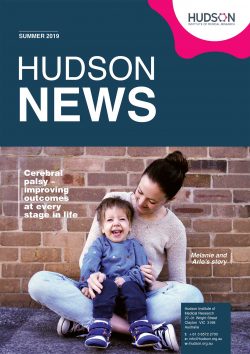From discovering a new lung cancer treatment, to empowering young women to consider a career in science—the last six months have seen a number of wonderful and diverse achievements at Hudson Institute that I’m delighted to share with you.
Our strength at Hudson Institute lies in the breadth of our researchers’ skillsets and our ability to approach a complicated issue from many angles. This issue’s feature on cerebral palsy highlights the multifaceted approach we take when addressing complex diseases. Our scientists look at every stage of life for a person with cerebral palsy, considering how treatments and therapies can improve wellbeing and physical outcomes.
Lung adenocarcinoma is the most common form of lung cancer and the leading cause of cancer death worldwide. It is, therefore, no understatement to say the discovery by our researchers of a drug that can suppress tumours in lung adenocarcinoma is a medical breakthrough.
This very aggressive cancer has a survival rate of less than five years. The rapid tumour growth associated with this cancer renders radiation therapy ineffective and rules out surgery due to the size of tumours. The discovery by PhD student Mohamed Saad and Research Group Head Professor Brendan Jenkins of a drug that slows tumour growth has the potential to put these treatment options back on the table.
Gender equity is an important focus of Hudson Institute, not only bringing our own postdoctoral scientists through to the next level but also giving opportunities to young women in our community who are interested in pursuing a career in science.
In July we opened our doors to nine young women from secondary colleges in Melbourne’s southeast to participate in a two-week immersive program, aimed at increasing the number of women in science. We need to engage with young women and get them enthusiastic about science early on. Through the program we are showing young women the types of jobs in a science career, and how they can make a difference to human health and our community.
We would like to see this successful inaugural program become annual, because it’s only by investing early on that we can grow our female leaders of tomorrow.
I’m exceedingly proud of the work done by our researchers, and in this edition you will be introduced to one of our brilliant and upcoming stars, Dr Kate Lawlor. Dr Lawlor’s research focuses on understanding and controlling cell death pathways. By controlling cell death, we can find therapeutic targets for a wide variety of diseases, ranging from bacterial and viral diseases, to chronic diseases like type 2 diabetes and arthritis.
You will undoubtedly hear this talented researcher’s name in the future, as her work goes on to produce treatments that will benefit the lives of countless people.
Thank you once again to our supporters and community. Without you, our research wouldn’t be possible. I hope reading about our research allows you to see what an impact your continued support has in creating profoundly positive real-life impacts across a broad spectrum of health issues.
We hope you will continue to support our research so that in turn we can continue to progress projects that will result in new discoveries and new life-saving treatments. Have a safe and relaxing festive season, and I look forward to sharing more research updates with you in 2020.
Professor Elizabeth Hartland
Director and CEO

